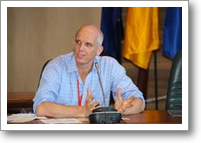Location
McGill New Residence Hall. 3625 Park Ave, Montreal.
Objectives
- Offer a space for reflection and experimentation around the challenge of managing multi-stakeholder projects
- Provide a space for reflection and experimentation on the issue of co-development between research and other stakeholders in conservation and sustainable management
- Show the role that facilitation and dialogue can play in multi-stakeholder projects and co-development.
- Show a central aspect of facilitation: the debriefing
- Stimulate researchers to move towards co-development and multi-stakeholder projects by providing space to open think tanks and future projects.
Description
If research on biodiversity is to have an impact on the decisions made to manage the natural world, we need to move away from traditional dichotomous approaches that maintain the gap between social and biological sciences, fundamental and applied research, and academics and practitioners. To start dissolving these boundaries, there has been a call to move toward the integration of human dimensions in biodiversity research, and to build more collaborative research.
This interactive workshop aims to facilitate a paradigm shift by stimulating participants to move towards more co-development in research, and to integrate facilitation and dialogue in biodiversity research to support this change.
This interactive workshop will use tools that allow participants’ involvement, with guided discussions, simulations and exercises such as constellations based on actual examples in Quebec. The facilitator will emphasize throughout the day the importance of human dimensions by developing the reflexivity of participants after each exercise.
Note that registration fees increase by 30% after December 4, midnight
For two-day training registration, see below.
Program
| Schedule | Object |
| 8:30 | Welcoming participants |
| 9:00 | Introduction, icebreaker, expectations |
| 9:30 | Clarification of the terms “multi-stakeholder projects” and “co-development” and the current context in research, conservation and sustainable development in which these projects emerge |
| 9:50 | Interactive study case in plenary on a case of multi-actor project in the field of conservation / sustainable management / research: identify the challenges and difficulties that may exist and the next steps to meet these challenges |
| 10:45 | Coffee break |
| 11:05 | Constellation on the current paradigm as well as possibly the future paradigm concerning co-development in research |
| 12:15 | Potential support for consultation and facilitation in multi-stakeholder projects and co-development: Presentation |
| 12:40 | Lunch |
| 13:45 | Energizer |
| 14:00 | The debriefing. A central aspect of facilitation and human dimension in projects. Interactive work in groups. |
| 15:30 | Coffee break |
| 15:45 | Open forum to create exchange groups between participants around co-development and multi-stakeholder projects |
| 16:55 | Feedback on the day and written assessment |
| 17:15 | End of activities |
Facilitator
Yorck von Korff

Doctor in politic science, certified facilitator in 2005 (International Association of Facilitators), mediator (continuing education of 2 years, Germany, graduation in 2008). Yorck von Korff has 17 years of practical experience in territorial consultation in France and abroad, including multiple projects for the management of natural resources (especially in water) and biodiversity. Scientific publications on the of participatory approaches.
From Germany, Yorck speak fluently French, English and German.
Two-day training on facilitation and the development of participative processes
14 – 15 December 2017
First come – first served – 16 places available
Rates
QCBS member: $ 50
Student Non-QCBS members: $ 150 (limited availability)
Others : $ 250 (limited availability)
(Lunch and coffee breaks included)
Training objectives
The management of the natural environment faces obstacles that require collaborative approaches allowing the integration of knowledge, values and perspectives of the different actors involved. The importance of these collaborative approaches is now widely recognized both in the academic world for the implementation of interdisciplinary projects or in the practical world where the implementation of participatory processes is now common. This training thus proposes to train the participants in the implementation of these processes, and allow them to acquire an understanding of the functioning of groups and a knowledge base in facilitation. This includes knowledge about the facilitator’s position, understanding how to analyze the context in which to operate, and being able to use the appropriate tools. The training also offers participants the opportunity to advance on their own projects that might include the organization of meetings or workshops. Finally, the training provides a fertile environment for exchanges on facilitation experiences between the participants and the trainer.
Training Program
T1: Learn what facilitation is and is not. To be able to position facilitation in a range of participatory methods (such as conciliation, mediation, co-decision, etc.). Learn the 4 functions of the facilitator.
T2: Learn how to position yourself in relation to other actors. The positioning of a facilitator is not trivial and can have strong consequences on her/his legitimacy. Is she/he a third party outside the group? Or is she/he a hierarchical superior or a stakeholder?
T3: Understand when to analyze the context before facilitating a meeting or workshop. Understand the elements to be included in this analysis.
T4: Implement the facilitator’s “soft skills” while working with the group. Understand your own way of working in a group situation and begin to integrate those progresses in your work.
T5: Knowing how to practice an essential way of communicating – Nonviolent Communication. Understand how this form of communication is based on facilitator’s posture.
T6: Know a practical model for designing workshops and meetings. Understand when a tool can be used in a workshop or meeting.
T7: Create a comprehensive toolkit for interventions: Icebreakers, Participant Expectations Management, Collective techniques for situational analysis, Participatory modeling, Focused conversation, Brainstorming, Shared vision, Supportive dialogue, Small group change and plenary, Control of consensus (to avoid soft consensus), Participatory action plans, Feedback.
T8: Integrate training content into practice. Reflect at the end of the session on a progress plan by integrating the learning of the training.


